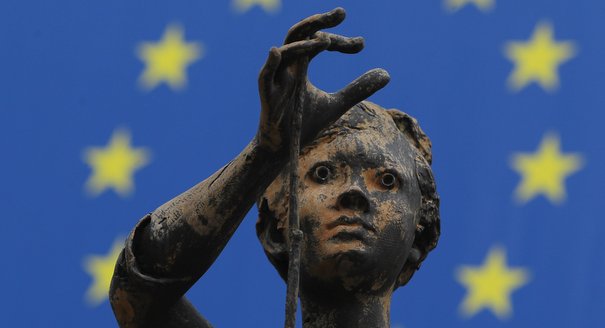Unsurprisingly, “austerity,” that poisoned simplification, is at the center of the debate. Those who defend Merkel’s recipe for tackling the euro crisis—multibillion-euro pledges to guarantee the single currency in return for substantial reforms in the afflicted countries—are delighted that the chancellor is back for another four years.
Those who believe that this approach is overly harsh and only aggravates the malaise of already weakened economies are shell-shocked. Their last hope is that a more Keynesian coalition partner will force her to become more lenient.
But Merkel’s critics are missing the point entirely. For a start, her recipe (which was never really “her” recipe, but that of a majority of EU and eurozone members) seems to be working. Competitiveness in Spain and Greece is up, and even unemployment rates in Greece have started to fall.
Yet the real risk in Merkel’s EU policy lies elsewhere—and it may turn out to be a much greater threat to the EU than austerity could ever be.
On August 16, the German chancellor announced in a radio interview that it was time to repatriate certain EU competences from the central institutions back to the member states. She also said that “more Europe” could be achieved simply through better coordination among national governments, rather than by pooling competences within the institutions. She effectively announced that she was against a widening of the community method, that quintessentially EU mechanism that lies at the heart of European integration. She basically said no to political union.
Dyed-in-the-wool Euroskeptics, of course, will rejoice. But they should not cheer so fast. Because this approach, if turned into policy over the next few years, could severely damage the EU, including those parts of the union that even Euroskeptics tend to like: economic liberty, the single market, and a common trade policy.
Even before the euro crisis, the EU suffered from a huge integration imbalance. Economic integration had gone far and deep, but the political process to accompany and, if necessary, regulate it never caught up. To a large extent, the crisis is the result of this imbalance.
Over the last few years, the crisis has increased economic integration even further. Member states put in place many mechanisms that deepened cooperation between, and centralized control over, national economic policies. Again, the political dimension failed to integrate at the same pace. So the gap between political and economic integration has widened even further.
In the short term, ignoring the intimate relationship between economics and politics can work. In the long run, it will likely backfire and may lead to more upheaval a few years down the road. A shared currency needs unified political guidance on everything from tax policies to the retirement age, from streamlined budget processes to labor market regulation and social policies. That is the brutal logic of a common currency, as demonstrated amply by the current crisis.
By waving goodbye to more political integration, Merkel has diminished the chances of ever rebalancing the European integration project. Without a gradual expansion of the community method to policy fields that are vital to eurozone stability, there is little chance that the EU’s political dimension can ever catch up with its economic side.
This could well destroy the whole project. Not immediately—perhaps not even in the next five years. But in the long term, the imbalance is likely to be unsustainable. The old dream that (sweet) economics can somehow be separated from (ugly) politics will, once more, prove to be an illusion.
In her remarks on August 16, Merkel removed one important psychological element from the integration debate: the tacit agreement that Germany is always willing to go the extra mile to make “Europe” happen. In other words, that Germany, whose history, size, and geography give it a special responsibility for the continent, is the reserve power ready to forgo its narrow national interest in order to enable pan-European compromise. Now that confidence is gone. When Berlin turns Gaullist, Europe will grind to a halt.
Europe’s current political landscape is anything but integration-friendly, and observers could be tempted to label Merkel’s policies realistic and pragmatic. There is certainly no constellation for more political union right now. And, indeed, the political reform that the EU sorely needs looks politically impossible at the moment. Only firm leadership, as painful and unpopular as it is, could resolve that dilemma.
Angela Merkel has demonstrated impressive leadership in defending her recipe for handling the economic crisis. I admire her for that, and I voted for her party. But now I fear that if she does not show the same skills to avert a political crisis, she will destroy what she set out to protect.









